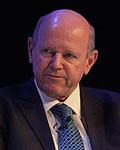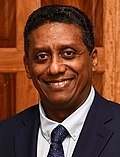History
Historically, French-speaking European Seychellois were divided between two classes, grands blancs, who represented the wealthy planter class, and petit blancs, who represented the working classes. The grands blancs are a less numerous group, composed of only about forty large families, but held most of the land and political power in the islands in the colonial era. [2] The Planters and Taxpayers Association, which represented the interests of the grands blancs, dominated the Legislative Council of Seychelles from its inception in 1962. The two groups were historically divided, and as a consequence the petit blancs were politically aligned with the Seychellois Creole people by the 1960s. Upon the independence of Seychelles, many Franco-Seychellois played important roles in the development of a one-party socialist state under the leadership of France-Albert René (himself ethnically French) and the Seychelles People's United Party. [3]
Modern history
Franco-Seychellois play an important role in the country's economy. They are employed in all sectors, including government, business and education.
This page is based on this
Wikipedia article Text is available under the
CC BY-SA 4.0 license; additional terms may apply.
Images, videos and audio are available under their respective licenses.









